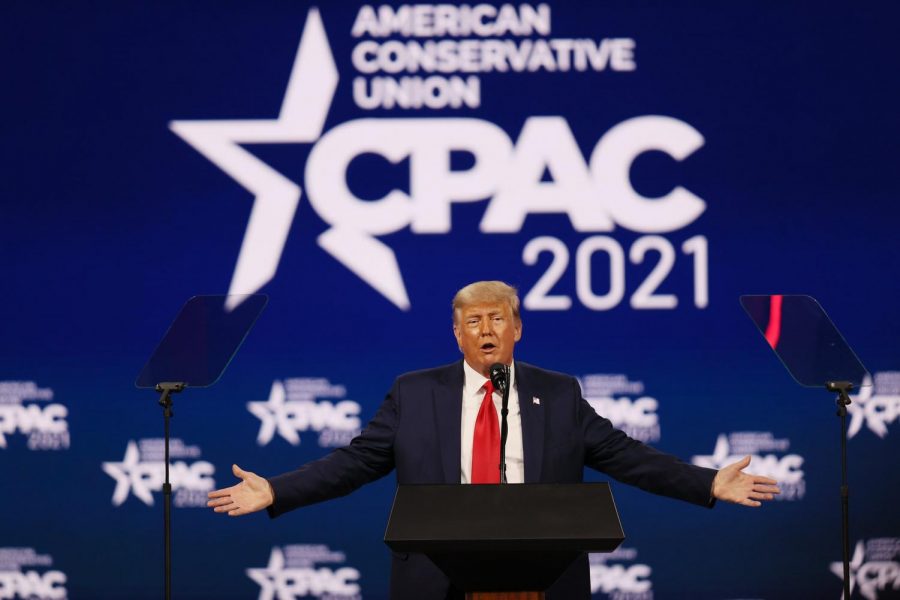Trumpism: The Future of the Republican Party
Donald Trump is more than just the face of the Republican Party; he is the Republican Party. If there was ever any doubt about the former president’s future within the GOP, the 2021 CPAC laid it to rest. The conference reflected a shift in the politics of American conservatism. With attendees posing for photos alongside a metal replica of Trump, this shift could not be represented more symbolically. The CPAC did all it could to affirm the Republican Party’s long-time transformation into the party of Trump. In his first public appearance since leaving office, former President Trump delivered an hour and a half long speech to close the conference, revealing his vision of the future for the GOP and America. While his speech lacked substance, one fact remains glaringly clear: Trumpism will not fade out of the Republican Party, but will come to define it.
Historically, the CPAC has proved to be a worthy indicator of the direction and standing of American conservative politics. With this year’s conference resembling Trump-Con, it is hard to imagine how the Republican Party can leave him behind. The base that the former president has amassed is loyal to him, not the institution of the GOP. A Suffolk University/USA Poll of 1,000 Trump voters found that 46% would abandon the Republican Party in favor of a Trump-centered party. While Trump himself, in his CPAC speech, deemed talk of a Trump Party as “fake news,” it nonetheless demonstrates the hold that Trump has on the GOP. In that same poll, only 19% believe that the GOP should return to its roots in establishment Republicans. This is why Republicans like Senator Ted Cruz embrace — and worship — Trump. Cruz, who enthusiastically claimed during his CPAC appearance that “Donald J. Trump ain’t goin’ anywhere,” understands the power Trump holds over conservative voters. Support and praise for the former president is necessary for the future success of both his own political career and his party’s.
The conservatives’ loyalty to Trump was not just apparent in the CPAC’s sea of red MAGA hats, frequent chants of the former president’s name and “We love you!” as he spoke, but also in the absence of more establishment Republicans. Utah Senator and 2012 Republican Presidential Nominee Mitt Romney’s absence suggests that there is no place for Trump’s adversaries in the GOP’s future. Romney has been one of the most outspoken Republican critics of Trump, even voting to convict Trump in the former president’s first impeachment trial.
Not invited to the conservative conference, Romney represents the willingness of conservatives to leave establishment Republicans behind, especially if they express any opposition to Trump. A Quinnipiac poll revealed that, even after Trump’s second impeachment, 75% of Republicans want to see Trump play a prominent role in the Republican Party. The absence of Republicans like Romney at the CPAC and the sizable hunger for more Trump within the GOP points to a future where one of America’s major political parties is at the behest of one man and his worldview.
In the wedding of the Republican Party and Trumpism, it becomes clear what the GOP will come to represent and stand for. At its core are two things: a rejection of the establishment and a sense of unbridled nationalism.
The rejection of the establishment is twofold. First, this new conservative movement calls for a rejection of what Trump calls in his speech, “RINOs,” or “Republicans in Name Only.” In other words, any Republican who opposes Trump cannot possibly be a real Republican, and therefore resemble a threat to the party. Secondly, the GOP, under Trump’s lead, will reject the supposed assault on America and all that it stands for by the current “socialists,” “communists” and “radical leftists” in charge. Trump’s populist approach thus becomes that of the GOP.
Through fear-mongering and polarizing rhetoric, Trump’s Republican Party calls its supporters to fight against the power-hungry foes who want to silence Americans and take away their rights. It is only Trump and the GOP who can save America from the “cancel culture” that has come to destroy us. This call to reject and fight back is fueled by the underlying sense of nationalism that also lies at the core of Trump’s movement.
The Republican Party will now be defined by Trumpism’s nationalist identity. Guided by the empty phrase of “America First,” Trump’s GOP will supposedly focus on strengthening the military, cracking down on immigration and ensuring that our history is not “erased.” The GOP will be the defender of freedom and liberty, defining American qualities that are apparently under siege by the current administration and the “mob” of woke leftists.
Essentially, Trump has transformed the Republican Party into one that brands itself as the saviors of America, the ones who will take it back as if it were stolen. The mentality is simple: it is “us versus them.”
With such a mentality, the GOP will become nothing more than a party of platitudes. Provocative rhetoric will take the place of substantial policy plans, and the party will be characterized by embellishment and Trump’s lies. The former president’s hold on the party cannot be overstated. If three-fourths of the party want him on board for the future — despite his loss in the recent election and his role in inciting the notorious attack on the Capitol — it says a lot about that party as an institution.
To drop Trump would mean to admit that he is not needed. However, it seems if that were to happen, the GOP would be in danger of losing the considerable mass of Trump’s extremely loyal base. Yet, keeping Trump signals that he is imperative to the success of the party, and with Trump and his egoist personality, he becomes the party.
Michael Pappano, FCRH ’22, is a digital technology and emerging media major and film and English minor from Buffalo, N.Y.










































































































































































































